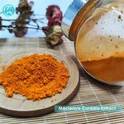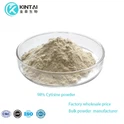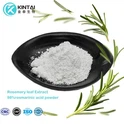D-glucosamine sulfate powder is a popular dietary supplement primarily used to support joint health and alleviate symptoms associated with osteoarthritis. This naturally occurring compound is derived from the shells of shellfish or produced synthetically in laboratories. It plays a crucial role in the formation and maintenance of cartilage, the flexible tissue that cushions joints. As people age or experience joint-related issues, supplementing with D-glucosamine sulfate powder has become increasingly common. This article will explore the uses, benefits, and potential side effects of D-glucosamine sulfate powder, providing you with comprehensive information to make informed decisions about its use.
How does D-Glucosamine Sulfate 2KCl Powder benefit joint health?
D-Glucosamine Sulfate 2KCl powder is widely recognized for its potential benefits in supporting joint health. This compound is a key component in the synthesis of glycosaminoglycans and proteoglycans, which are essential building blocks of cartilage. As we age, our bodies' natural production of glucosamine decreases, potentially leading to joint deterioration and osteoarthritis symptoms.
Supplementing with D-Glucosamine Sulfate 2KCl powder may help replenish the body's glucosamine levels, supporting the maintenance and repair of cartilage. This, in turn, can contribute to improved joint function and reduced pain associated with osteoarthritis. Several studies have demonstrated the potential benefits of glucosamine supplementation in managing osteoarthritis symptoms, particularly in the knees.
One of the primary mechanisms through which D-Glucosamine Sulfate 2KCl powder benefits joint health is by potentially slowing down the progression of cartilage degradation. It may help stimulate the production of new cartilage and reduce inflammation within the joints. This anti-inflammatory effect can be particularly beneficial for individuals suffering from osteoarthritis, as chronic inflammation is a key factor in joint pain and stiffness.
Moreover, D-Glucosamine Sulfate 2KCl powder may help improve joint mobility and flexibility. By supporting the structural integrity of cartilage, it can contribute to smoother joint movements and potentially reduce the friction between bones. This can lead to increased comfort during physical activities and daily tasks that involve joint movement.
It's important to note that while many individuals report positive effects from using D-Glucosamine Sulfate 2KCl powder, the scientific evidence is mixed. Some studies have shown significant improvements in joint health and osteoarthritis symptoms, while others have found more modest or inconclusive results. The effectiveness of glucosamine supplementation may vary depending on factors such as the severity of joint issues, individual physiology, and the specific formulation of the supplement.
For optimal results, it's often recommended to combine D-Glucosamine Sulfate 2KCl powder with other joint-supporting nutrients like chondroitin sulfate and methylsulfonylmethane (MSM). This combination may provide synergistic effects, potentially enhancing the overall benefits for joint health. As with any supplement regimen, it's advisable to consult with a healthcare professional before starting D-Glucosamine Sulfate 2KCl powder supplementation, especially for individuals with pre-existing medical conditions or those taking medications.
What are the potential side effects of D-Glucosamine Sulfate 2KCl Powder?
While D-Glucosamine Sulfate 2KCl powder is generally considered safe for most people when taken as directed, it's important to be aware of potential side effects that may occur. Understanding these possible adverse reactions can help users make informed decisions and monitor their health while taking the supplement.
One of the most commonly reported side effects of D-Glucosamine Sulfate 2KCl powder is gastrointestinal discomfort. Some individuals may experience symptoms such as nausea, heartburn, diarrhea, or constipation. These digestive issues are usually mild and often subside as the body adjusts to the supplement. Taking the powder with food or dividing the daily dose into smaller portions throughout the day may help alleviate these symptoms.
Headaches are another potential side effect reported by some users of D-Glucosamine Sulfate 2KCl powder. While not extremely common, some individuals may experience mild to moderate headaches, particularly when first starting the supplement. If headaches persist or become severe, it's advisable to consult a healthcare professional.
Some people may also experience allergic reactions to D-Glucosamine Sulfate 2KCl powder, especially those with shellfish allergies. Since glucosamine is often derived from the shells of crustaceans, individuals with shellfish allergies should exercise caution and consider alternative sources of glucosamine or consult their doctor before use. Allergic reactions may manifest as skin rashes, itching, or in severe cases, difficulty breathing.
There have been concerns about the potential impact of D-Glucosamine Sulfate 2KCl powder on blood sugar levels, particularly in people with diabetes or pre-diabetes. Some studies suggest that glucosamine may affect insulin sensitivity and glucose metabolism. While the evidence is not conclusive, individuals with diabetes should monitor their blood sugar levels closely when taking glucosamine supplements and consult their healthcare provider for guidance.
In rare cases, D-Glucosamine Sulfate 2KCl powder may interact with certain medications. For example, it may enhance the effects of blood-thinning medications like warfarin, potentially increasing the risk of bleeding. Additionally, some research suggests that glucosamine might interact with certain cancer treatments, although more studies are needed to confirm this interaction.
It's worth noting that long-term safety data on D-Glucosamine Sulfate 2KCl powder supplementation is limited. While many people use the supplement for extended periods without significant issues, the effects of prolonged use are not fully understood. As with any long-term supplement regimen, it's advisable to have regular check-ups with a healthcare provider to monitor overall health and address any concerns.
Pregnant and breastfeeding women should exercise caution when considering D-Glucosamine Sulfate 2KCl powder supplementation. Due to limited research on its effects during pregnancy and lactation, it's generally recommended to avoid use unless specifically advised by a healthcare professional.
To minimize the risk of side effects, it's crucial to follow the recommended dosage instructions on the product label or as advised by a healthcare provider. Taking excessive amounts of D-Glucosamine Sulfate 2KCl powder does not necessarily lead to better results and may increase the likelihood of experiencing adverse effects.
Can D-Glucosamine Sulfate 2KCl Powder help with other health conditions besides joint issues?
While D-Glucosamine Sulfate 2KCl powder is primarily known for its potential benefits in supporting joint health, some research suggests that it may have applications in other areas of health as well. However, it's important to note that many of these potential benefits are still being studied, and more research is needed to draw definitive conclusions.
One area of interest is the potential role of D-Glucosamine Sulfate 2KCl powder in supporting digestive health. Some studies have suggested that glucosamine may help protect the lining of the digestive tract and reduce inflammation in conditions such as inflammatory bowel disease (IBD). The anti-inflammatory properties of glucosamine could potentially help alleviate symptoms and support the healing of the gut lining. However, more clinical trials are needed to confirm these effects and determine appropriate dosages for digestive health purposes.
Another potential application of D-Glucosamine Sulfate 2KCl powder is in supporting cardiovascular health. Some research has indicated that glucosamine supplementation may have a positive impact on markers of cardiovascular risk, such as reducing levels of C-reactive protein, a marker of inflammation associated with heart disease. Additionally, some studies have suggested that glucosamine may help lower blood pressure and improve lipid profiles. However, these findings are preliminary, and more extensive research is needed to establish the role of glucosamine in cardiovascular health.
Interestingly, some studies have explored the potential of D-Glucosamine Sulfate 2KCl powder in supporting skin health. Glucosamine is a precursor to hyaluronic acid, a compound that plays a crucial role in maintaining skin hydration and elasticity. Some research suggests that glucosamine supplementation may help improve skin hydration and reduce the appearance of fine lines and wrinkles. However, more studies are needed to determine the optimal dosage and long-term effects of glucosamine for skin health.
There has also been interest in the potential neuroprotective effects of D-Glucosamine Sulfate 2KCl powder. Some animal studies have suggested that glucosamine may have protective effects on brain cells and could potentially play a role in supporting cognitive function. However, human studies in this area are limited, and more research is needed to understand the potential benefits of glucosamine for brain health.
It's important to emphasize that while these potential benefits are intriguing, the primary use of D-Glucosamine Sulfate 2KCl powder remains focused on joint health. The evidence for its effectiveness in other health conditions is generally less robust than for its traditional use in supporting joint function and managing osteoarthritis symptoms.
As research continues, it's possible that new applications for D-Glucosamine Sulfate 2KCl powder may be discovered. However, individuals considering using this supplement for purposes other than joint health should consult with a healthcare professional. They can provide guidance based on the most current research and help determine if glucosamine supplementation is appropriate for individual health goals and circumstances.
In conclusion, D-Glucosamine Sulfate 2KCl powder is a versatile supplement primarily used for supporting joint health and managing osteoarthritis symptoms. While it shows promise in potentially benefiting other areas of health, more research is needed to fully understand its effects beyond joint support. As with any supplement, it's important to use D-Glucosamine Sulfate 2KCl powder responsibly, follow recommended dosages, and consult with healthcare professionals, especially when considering its use for conditions other than joint health.
Our D-Glucosamine Sulfate 2KCI Powder Bulk has received unanimous praise from customers. If you would like to know more about this product, please feel free to contact Sales@Kintaibio.Com.
References:
1. Towheed, T. E., Maxwell, L., Anastassiades, T. P., et al. (2005). Glucosamine therapy for treating osteoarthritis. Cochrane Database of Systematic Reviews, (2).
2. Reginster, J. Y., Deroisy, R., Rovati, L. C., et al. (2001). Long-term effects of glucosamine sulphate on osteoarthritis progression: a randomised, placebo-controlled clinical trial. The Lancet, 357(9252), 251-256.
3. Clegg, D. O., Reda, D. J., Harris, C. L., et al. (2006). Glucosamine, chondroitin sulfate, and the two in combination for painful knee osteoarthritis. New England Journal of Medicine, 354(8), 795-808.
4. Dahmer, S., & Schiller, R. M. (2008). Glucosamine. American Family Physician, 78(4), 471-476.
5. Kantor, E. D., Lampe, J. W., Peters, U., et al. (2015). Use of glucosamine and chondroitin supplements and risk of colorectal cancer. Cancer Causes & Control, 26(4), 561-570.
6. Monauni, T., Zenti, M. G., Cretti, A., et al. (2000). Effects of glucosamine infusion on insulin secretion and insulin action in humans. Diabetes, 49(6), 926-935.
7. Pocobelli, G., Kristal, A. R., Patterson, R. E., et al. (2010). Total mortality risk in relation to use of less-common dietary supplements. The American Journal of Clinical Nutrition, 91(6), 1791-1800.
8. Wilkens, P., Scheel, I. B., Grundnes, O., et al. (2010). Effect of glucosamine on pain-related disability in patients with chronic low back pain and degenerative lumbar osteoarthritis: a randomized controlled trial. JAMA, 304(1), 45-52.
9. Anderson, J. W., Nicolosi, R. J., & Borzelleca, J. F. (2005). Glucosamine effects in humans: a review of effects on glucose metabolism, side effects, safety considerations and efficacy. Food and Chemical Toxicology, 43(2), 187-201.
10. Henrotin, Y., Mobasheri, A., & Marty, M. (2012). Is there any scientific evidence for the use of glucosamine in the management of human osteoarthritis? Arthritis Research & Therapy, 14(1), 201.







